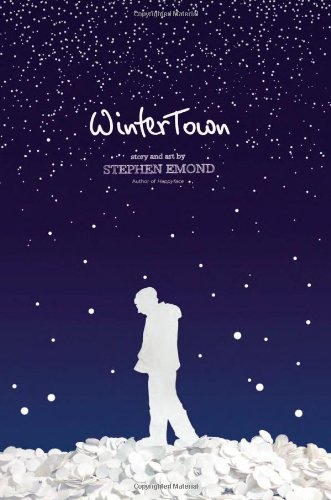
Little, Brown BFYR, December 5, 2011
contemporary young adult
ARC received from publisher (thank you!)
Summary:
Eric and Lucy have always spent their holidays together. But one year, Lucy comes back with a complete punk makeover, from her hair to her attitude. Eric’s sure he can uncover the old Lucy if he looks hard enough… but with his parents always on his case about university and Lucy with her own family troubles, these two friends will have to search hard to find their way back to each other.The cover:
Matches the winter theme, yes, and the white silhouette (instead of a black one) complements the navy blue as a nice change. However, the snow as hole-punches seems random. Like, why? Are we going for a stationery theme here or what?
The book:
Let’s say this upfront—the illustrations are fab. The loose, casual comic drawings are probably the only kind of cartoon that would work exceptionally well with YA besides manga, and in black and white they look even more stylish. The fact that there’s a mini and charming storyline within makes them an excellent source of dramatic relief (to use some playwright lingo).
Otherwise? Not much to talk about. Voice—Stephen Edmond does not capture it. The writing is there, always in the way for you to spot and occasionally trip over; there’s no sense of style (in contrast to the illustrations, which makes sense if Edmond was originally an illustrator). Sure, maybe Eric has school and parental figure problems, but without anything to endear him to the reader, we really don’t give a fig.
Same with Lucy. TTtT (to tell the truth), when her perspective came around, I was put off even more. With her “he doesn’t know what happened to me” pout and her wild urges (e.g. graffiti on walls, break Eric’s heart [WTH?]) that are obvious stereotypes, Lucy seems more like a stock character whose bleak and cynical outlook combine with her druggie boyfriend and overblown homefront problems to prevent the reader from liking her at all.
It’s awful to say this, but even the ‘rents are stereotypes. Eric’s father is the pressuring, get-into-an-Ivy-League-uni dad, while Lucy’s parents are used to explain away her newfound issues. And the plot: after the expected almost-romance and fight, the two go their separate ways, and the only light comes when they chance to see each other on the streets of Brooklyn. I mean, way to wrap up a downward-spiraling story. Tacking on an extra ray of hope doesn’t make this novel inspiring.
Rating: 2 out of 5








